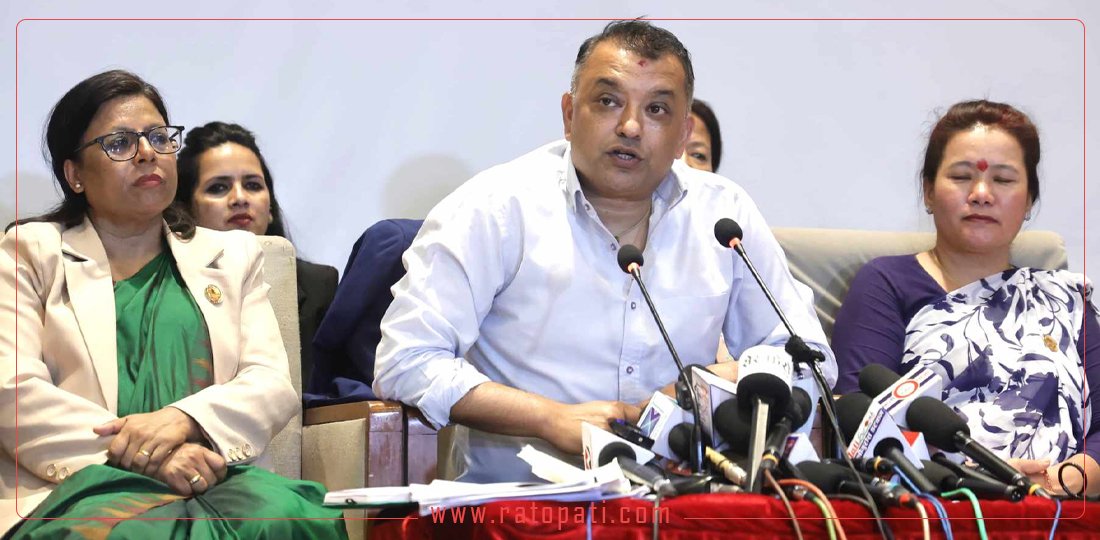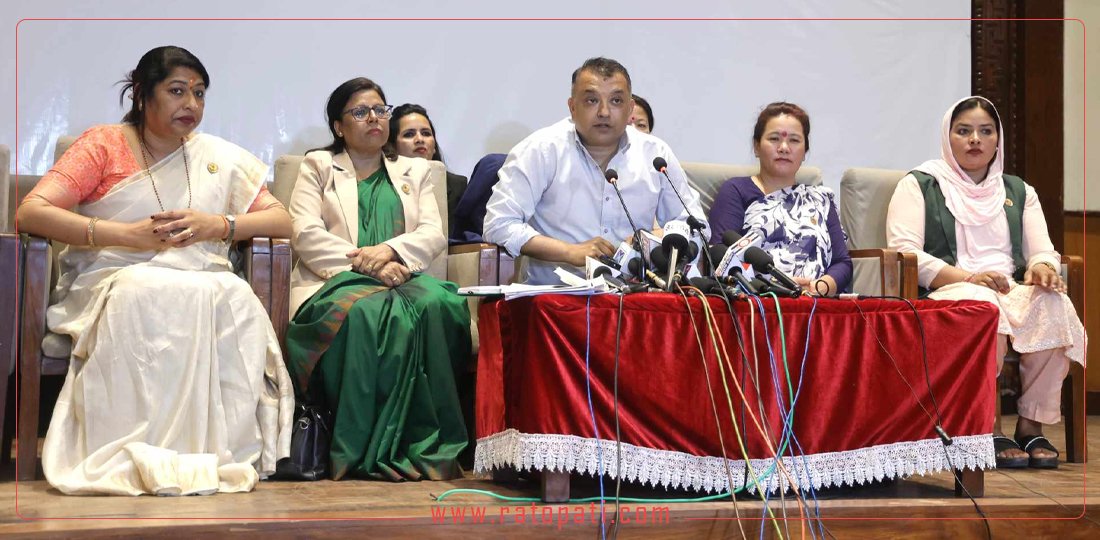Review of World Affairs
* Help for Ukraine
* China’s Grand Strategy
* India’s General Election Second Phase
* German Foreign Policy

By Shashi P.B.B. Malla
Ramifications of US Help for Ukraine
Now that US President Joe Biden has signed a US Dollar $ 61 billion assistance package for Ukraine, the Financial Times’ (FT) Max Seddon, Christopher Miller, and John Paul Rathbone write that Western defence officials and analysts predict it will help Kyiv blunt an expected spring or early summer Russian offensive this year.
The FT authors and the experts they quote suggest that offensive is likely to rely, as the Russian war effort has of late, on a high quantity of low-tech weapons like artillery shelling, drones and glide bombs.
The US assistance will flesh out what has recently appeared to be a promising but under-equipped Ukrainian defence, Gabriel Elefteriu writes for Brussels Signal: “Amid major problems and overall setbacks at the front, the Ukrainians have also been having some tactical successes of their own that demonstrate what can be achieved against Russian forces if more Western military support becomes available. For example, the Ukrainian military has recently managed to destroy a S-400 battery in Crimea, apparently with ATACMS missiles secretly provided by the U.S. weeks ago…Over the past week, Ukrainian forces have also shot down a Tu-22M3 strategic bomber [a highly prized Russian asset] at very long range.”
Arguing the opposite, Ted Snider writes for the The American Conservative that Ukraine faces a shortage of manpower, not just weapons. [However, Kyiv recently revamped its draft rules, lowering the conscription age, seeking to address that problem.]
The aid package, Snider contends, “will not provide the promised victory. The one thing it will do is prolong the war and continue the loss of Ukrainian life and land.”
China’s Plausible Endgame
It’s no secret that China [as well as, Russia and Iran] wants to change the world by undermining the liberal-democratic, Western-dominated international order that has constrained Beijing from some of its global ambitions. In a Foreign Affairs essay, ardent China analyst Elizabeth Economy warns against dismissing that broad aim of Chinese foreign policy.
“Xi’s vision is far more formidable than it seems,” Economy writes.
China’s proposals to other countries, like its Belt and Road infrastructure initiative, its newer Global Development Initiative, and a model for state control of the internet, “would give power to the many countries that have been frustrated and sidelined by the present order…Beijing’s initiatives are backed by a comprehensive, well-resourced, and disciplined operational strategy – one that features outreach to governments and people in seemingly every country. These techniques have gained Beijing newfound support, particularly in some multilateral organizations and from non-democracies. China is succeeding in making itself an agent of welcome change while portraying the United States as the defender of a status quo that few particularly like.”
A Comforting Perspective on Taiwan
The world is beset by war, from Ukraine to Gaza to Sudan to Ethiopia to Myanmar.
On the bright side, one major flashpoint is currently calm. At the Lowy Institute’s (Sydney) Interpreter blog, Denny Roy argued recently that mainland China is unlikely to launch a major invasion of Taiwan anytime soon.
Beijing hasn’t yet attained the military might that would make seizing the island a fait accompli, Roy writes.
The US appears to be committed to defending Taiwan, and Chinese leader Xi Jinping can cement his legacy in other ways, through various big domestic projects besides re-unifying Taiwan.
Broadly, Roy argues: “A struggling economy does not make Beijing more likely to launch a war. China’s economic malaise appears to have dampened the Chinese public’s enthusiasm for a Taiwan campaign. The natural reaction to a lack of strength at home is to be more cautious in foreign affairs, not more aggressive.”
At the same time, as Michael D. Swaine wrote last month for the Quincy Institute for Responsible Statecraft, Washington and Beijing remain seriously at odds over Taiwan, macro trends point toward an eventual confrontation, and the matter would trump other dimensions of any US-China rapprochement. (CNN/Fareed Zakaria: Global Briefing, April 26).
Turnout Falls in India’s Second Phase Elections
Modi & Gandhi Trade Barbs
India held the second phase of the world’s largest election last Friday, with Prime Minister Narendra Modi and his rivals hurling accusations of religious discrimination and threats to democracy amid flagging voter turnout (Reuters, April 26).
Almost one billion people are eligible to vote in the seven-phase general election that began on April 19 and concludes on June 1, with votes set to be counted on June 4.
Modi is seeking a record-equalling third straight term on the back of his economic record, welfare measures, national pride, Hindu nationalism and personal popularity. Surveys suggest he will easily win a comfortable majority.
His challengers have formed an alliance of more than two dozen parties and are promising greater affirmative action, more handouts and an end to what they call Modi’s autocratic rule.
A total of 88 seats out of the 543 in the Lok Sabha, the lower house of parliament went to the polls on Friday with 160 million people eligible to vote across 13 states and federal territories.
Approximate voter turnout data at the end of polling put Friday’s turnout at 61% percent lower than the 65 % percent in the first phase last week, and 68 % percent in the second phase five years back.
The Election Commission and political parties are concerned that unseasonably hot weather, and weddings in some parts of the country, would affect turnout.
Analysts say that there is no single issue strong enough to pull voters out this time and the committed Hindu nationalistbas of Modi’s Bharatiya Janata Party (BJP) may not be stepping out due to complacency or overconfidence, resulting in lower turnouts.
Heated Campaign
More than half the seats in Friday’s contests were in the southern states of Kerala and Karnataka and the north-western state of Rajasthan.
The campaign has become more heated since the first phase of voting on April 19 as Modi and the main opposition Congress party have faced off on communal issues with Modi accusing Congress of favouring minority Muslims, aiming to dilute affirmative action and planning to impose inheritance tax.
Congress has denied the charges and said Modi fears losing and was using divisive language to distract voters from real issues such as unemployment, rising prices and rural distress.
But some voters were responding to the BJP.
“I will vote for BJP. Muslims will get a lot of benefits if Congress comes to power and I don’t want taxpayers money to go for the benefit of any one community,” said Shree Hari S.S., 23, who voted in the tech hub of Bengaluru.
Others were not happy with what they said was a sectarian shift in politics.
“BJP is using temples and mosques to create a divide between Hindus and Muslims, to move away from real issues such as unemployment and rising prices,” said Sokin Qureshi, 29, an unemployed Muslim voter in the northern city of Mathura. (Reuters)
Rahul Gandhi in the Fray
Rahul Gandhi, former Congress president and the face of the party, was among the 1,200 candidates hoping to be elected on Friday.
“This election is not a regular election . . . because for the first time in the history of India, one party and one person is trying to finish the constitution and democracy of India,” Gandhi said at an election rally in a region of Karnataka, which votes next week.
Gandhi is seeking re-election from Wayanand in Kerala and faces Annie Raja of the Communist Party of India (CPI) and BJP’s K. Surendran, among others, in the Left Front-ruled state.
In 2019, Gandhi defeated the CPI candidate by more than 400,000 votes, the highest margin in Kerala, although he lost his second seat to BJP in the family bastion of Amethi Uttar Pradesh, north India.
India allows a candidate to contest more than one seat but they can keep only one if they record multiple victories.
Congress slumped to a historic low when it was swept out of power by BJP in 2014 and won only its second-lowest number of seats – 52 – in 2019, with Kerala contributing the highest tally of 15.
The party is expected to do better in Karnataka this year where it won just one of 28 seats in 2019 but gained strength and defeated the BJP in state elections last year.
It is still seen to be struggling nationally as bickering within the opposition alliance “I.N.D.I.A” it leads and graft cases against some leaders has hobbled its challenge to Modi.
“Phase Two has been too good!” Modi posted on X after voting closed. “The unparalleled support for NDA is going to disappoint the Opposition even more,” he gushed, referring to his BJP-led ruling National Democratic Alliance. (Reuters)
Does German Foreign Policy Fail to Gain Traction?
The respected German newsmagazine Der Spiegel posits that Germany is still a lightweight in international affairs and that it has largely failed in its various excursions.
The government is conducting crisis diplomacy at all the global hotspots, but Berlin has failed to deliver much, and some are asking if Germany is even a global player – so the contention of the critical newsmagazine (April 25).
Der Spiegel goes to the extent of even questioning the value and necessity of the various initiatives undertaken by the country’s leading decision-makers.
With so many crises troubling the world, it would have been terribly amiss if a major power like Germany stood on the sidelines.
The China Factor
The newsmagazine describes Chancellor Olaf Scholz’s recent visit to China not only as a fiasco, but ridiculous.
His official visit was reduced to the fact that Germany would now export beef and apples to China in return for e-cars, i.e. China being portrayed as a high-tech country and Germany as a lowly agricultural state! The writers conclude: “That says a lot about Germany’s importance on the world stage”.
This definitely is over-simplifying matters quite a lot.
The magazine also belittles the forays into international politics (with tongue in cheek): “rarely before has a German government been so keen to contain wars and prevent new ones. Rarely before has the situation for Germany and Europe been as serious as it is today.”
At the same time, the magazine writes (half-seriously?): “Germany, the richest and most populous country in the European Union, can’t simply stand by and watch its neighbours slide into chaos.”
And, therefore, the chancellor travels to Beijing and asks Chinese President Xi Jinping to talk some sense into his friend Vladimir Putin.
And at the same time, German Foreign Minister Annalena Baerbock and Defence Minister Boris Pistorius are sending letters to countries around the world pleading for weapons to protect Ukraine.
No doubt, for years, leading German politicians and foreign policy pundits have been talking about the need for Germany to take on more responsibility.
But reading between the lines, Der Spiegel seems to imply that these trips, initiatives and talks do not really achieve anything. It is not really effective foreign policy, but action for the sake of action.
But as the greatly revered Mahatma Gandhi said:
You may never know what results will come of your actions
But if you do nothing there will be no results.
The writer can be reached at: shashipbmalla@hotmail.com
The views expressed in this article are the author’s own and do not necessarily reflect People’s Review’s editorial stance.
Source : https://www.peoplesreview.com.np/2024/04/30/review-of-world-affairs-25/






